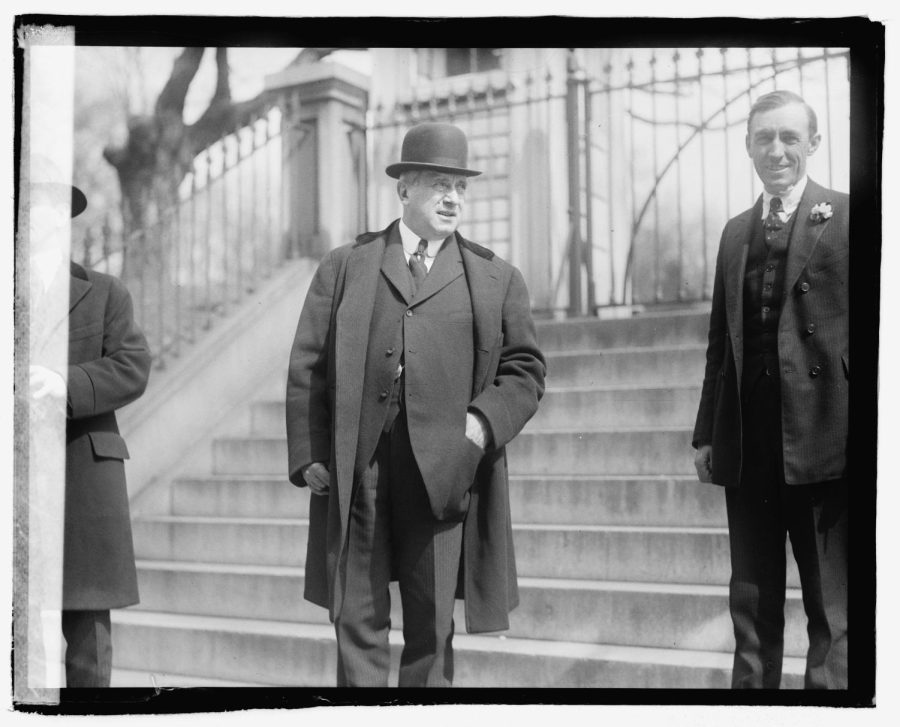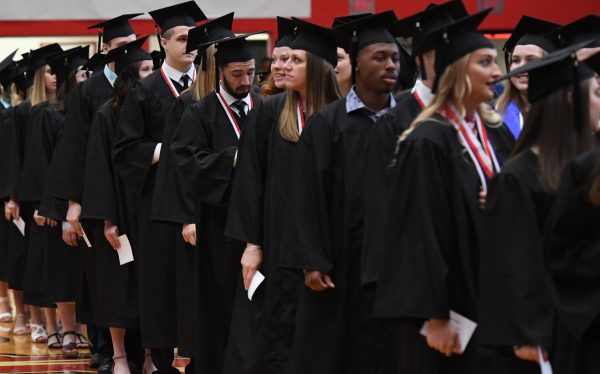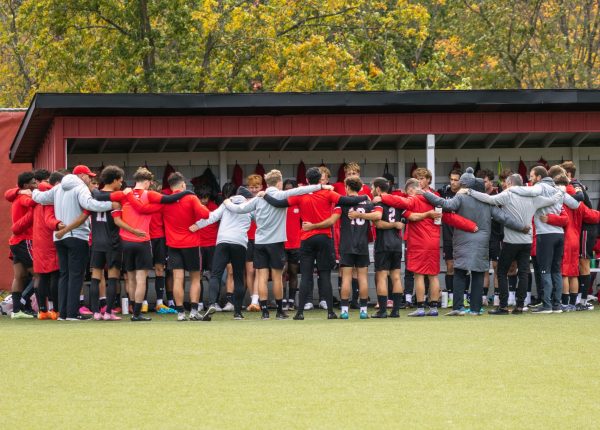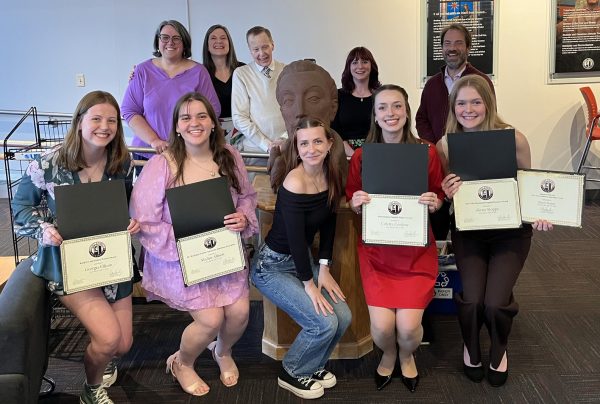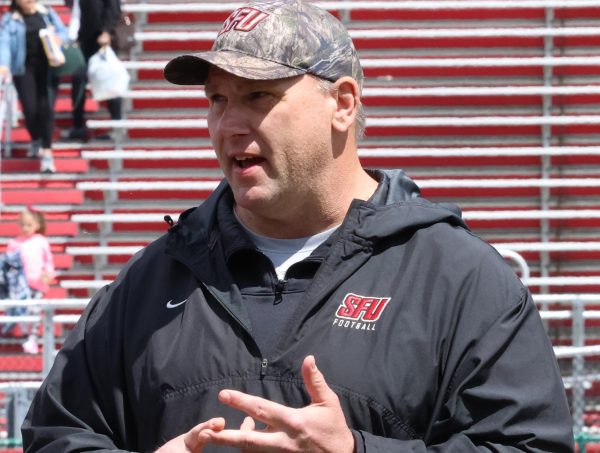Charles Schwab’s Legacy Endures in Loretto and Across America
In conjunction with the University’s 175th anniversary as an institution of higher learning in 2022, Troubadour staff writer Julia Willason interviewed Ann Dougherty. Ann’s great uncle in Charles Schwab. She is also the author of Our Schwab Heritage, a 370-page book chronicling her family’s history. The book was published in 2017.
JW: How are you related to Charles Schwab? What is your fondest memory of him?
AD: Charles Michael Schwab (1862-1939) was my great uncle – the eldest brother of my grandfather Edward H. Schwab, and uncle of my mother, Martha Schwab Dougherty. After being born in Maine in 1942 – three years after Uncle Charlie’s death – I spent most of my 80 years living in Connecticut. I learned about Schwab genealogy and family stories from my parents, and also from my Schwab aunts and uncle. I relished my time with my grandparents – Edward and Edith McGorray – and Great Aunt Mary Jane Schwab, who became Sister Cecelia of the Blessed Sacrament (she resided at the Carmelite Monastery in Loretto), and Great Aunt Gertrude Schwab Barry.
Probably one of my fondest memories of Uncle Charlie was when I visited Riverside, his 75-room chateau in New York City, for the last time in 1948, just as the palatial house was to be demolished. The mansion and gardens encompassed the entire block between 73rd and 74th streets and between West End Avenue and Riverside Drive, overlooking the majestic Hudson River. My memories of its splendor are still clear – towering turrets, marble columns and the stained-glass windows in the organ chapel. Uncle Charlie wished that Riverside be converted into a museum after his death, but that was not meant to be. Currently, Schwab House – a 19-story condominium complex – is located on the former site of Riverside.
JW: Your accounts of your lineage are very thorough. Did a certain ancestor or ancestorial time period resonate with you?
AD: All Schwab generations resonate with me. Before migrating to Germany nine generations ago, our first known Schwab ancestors farmed the land and herded sheep in the countryside near Basel, Switzerland. Around 1665, my great-great-great-great-great-great grandfather Friedrich Schwab traveled north – 90 miles along the Upper Rhein River – and settled in the village of Kappel am Rhein in Germany’s Black Forest. There he married, raised his children, served in the military, tilled and harvested the fields, and practiced his Catholic faith. Four generations later, my great-great grandfather Charles S. Schwab, along with two of his sisters, left their beloved Germany in 1830, and sailed to America looking for a new life.
By 1835, Charles had met and married Elanora (Elinor) Myers, settling into life in a log cabin along the rutted dirt road to Munster, near Loretto. As his family grew, Charles kept advancing his woolen and weaving business. He and his wife parented nine children, including John Anthony, who was my great-grandfather. Charles and Elanora’s three eldest children – Ellen Catherine, John Baptiste (who died in the year he was born) and John Anthony – were baptized by the founder of Loretto, Father Demetrius Augustine Gallitzin.
John Anthony and his spouse, Pauline Farabaugh, reared eight children – Charles Michael (CM as he was known to family members) being the eldest, and my grandfather, Edward H., being the youngest. Charles Michael was born in Williamsburg, Pennsylvania, during the second year of the Civil War, after the family moved there in 1857.
Charles S. had secured contracts with the government to manufacture woolen blankets and coats for the Union Army. Around 1870, the Schwab family returned home because John was suffering from vertigo and Pauline believed Loretto offered a better opportunity for religious schooling for their children.
I am in awe of our family genealogy. When I reflect on my ancestors, I dwell mostly on the centuries of our legacy – ones of a creative, bold and talented family blessed with much happiness and success, yet also anguished by considerable tragedy and heartbreak.
JW: Charles Schwab was a second-generation American. In your opinion, how do you think that impacted his business career?
AD: Charlie always held his grandfather and father in the highest regard. Charles S. and John Anthony worked tirelessly to provide for their families. John held various positions during his working life, progressing from weaver to banker. He taught his children the principles of hard work and the importance of ameliorating the hardships of others. John knew how to engage his children, particularly in the love of music and the art of storytelling. When Charlie left Loretto to venture out into the world, it was because of advice from his father, who believed the time had come for him to go forth and pursue gainful employment.
While the First Industrial Revolution had initially attracted the Schwab family to resettle in America, it was the Second Industrial Revolution that enabled Charlie to rise to his pinnacle of success. I believe it was because of our ancestral immigrants’ sacrifices and determination – and starting over in a new nation – that ultimately contributed to Uncle Charlie’s great achievements.
JW: How does it feel to have a relative who is such an integral part of American history?
AD: I wish I could have known Charlie personally. His growth from a day laborer to a titan in industry resulted from the opportunities he garnered in Pennsylvania’s mighty steel mills. My greatest admiration for Uncle Charlie was not that he was wealthy, but that he shared much of his good fortune with others. As a result of his charitable endeavors, many people benefited from his generosity during his lifetime – and others still do today.
My grandfather used to tell stories about Uncle Charlie never saying no to anyone who appealed to him for help. On one occasion, Charlie said, “Luck, opportunity, chance – call it what you will – there is certainly something that gives some men more than others an even break.” Charlie often said that he was dreamer and an optimist by nature. He also disclosed that he was never interested in making millions – it was the planning and building that most inspired him.
When the Stock Market crashed in 1929, Charlie was 67 years old and declining. The next decade was difficult for him, both physically and emotionally. His resignation from various boards and commissions, and the deaths of several family members, impacted his deteriorating health. On June 29, 1939, Charlie sailed to London on the Normandy. On Aug. 31, he arrived back in New York on the Washington, after having suffered several heart attacks. On Sept. 1, World War II began in Europe with Hitler’s invasion of Poland. On Sept. 18, Uncle Charlie died with his brother and sister (my grandfather and Great Aunt Gertrude) by his side.
JW: You wrote a book about your family lineage, Our Schwab Heritage, and the book referenced and quoted many original documents. Do you have a favorite preserved document that you cherish most?
AD: My home contains many meaningful treasures, including documents and books. The Charles M. Schwab testimonials – handwritten in lavish multicolored calligraphy – are my favorites. These historic items include leather-bound acknowledgements to Uncle Charlie from the Empire Trust Company, the Metropolitan Life Insurance Company, the American Iron and Steel Institute, and the New York Chamber of Commerce.
The most heartbreaking document that I possess is a copy of a letter from the Navy Department to Aunt Gertrude Schwab Barry, Uncle Charlie’s sister. Charles Schwab Barry – Gertrude’s son – lost his life when the USS Indianapolis sank after being hit by an enemy torpedo on July 30, 1945 – shortly before the end of World War II. Charles Barry had graduated from Saint Francis College and was honored with a commission in the U.S. Navy.
One of my favorite books – published in 1913 – is titled Woman in Science, by H.J. Mozans, A.M. Ph.D. It was dedicated to Aunt Emma Eurana (Rana) Dinkey Schwab, Uncle Charlie’s wife. The book inspired me to pursue a career in science because it emphasized the struggle of women to be recognized for their intellectual capacity and scientific pursuit. As a result, I taught Biology and Chemistry for nearly half a century.
Also among my treasures, I revere a large bronze plaque that the Chamber of Commerce of the State of New York presented to Charlie in appreciation of his services to the republic during World War I. Uncle Charlie received this plaque because President Woodrow Wilson had drafted him to lead the Emergency Fleet Corporation, the U.S. shipbuilding program, during the War.
I also cherish a sculpture that was awarded to Uncle Charlie by the Shipbuilders of the San Francisco Bay District. It consists of four convex panels and columns with classic figures representing industry, commerce, patriotism and progress. The whole is mounted on four winged horses rising from the sea, supporting a globe. The piece is signed by famed Armenian-American sculptor Haig Patigan.
JW: In your book, you describe your Uncle Charlie as a remarkable man with a riveting personality. Can you describe his character as an uncle and compare it to his character as a businessman?
AD: Whether it be the medals and awards he earned, or the poker and bridge games that he won or lost – Charlie was magnetic. Whether it be his active life in New York City, Pittsburgh, Bethlehem or Loretto – Charlie was flamboyant. Whether it be his ocean crossings or worldwide travel – Charlie was adventurous. Whether it be his accolades from renowned people or political relationships – Charles M. Schwab was significant. His standing has transcended his lifetime and the annals of American business history.
My mother often said that her father, Edward, exhibited many of Charlie’s characteristics – the way he walked, the way he held a cigar, the way he smiled, the way he cared about each individual regardless of wealth or esteem. The family believed that it was Charlie’s deep sense of Catholic faith that inspired him to build churches and monasteries and support educational institutions. The Schwabs were devoted to Father Gallitzin. In Loretto alone, Charlie financed Saint Michael’s Church, the life-sized statue of Father Gallitzin and the Carmelite Monastery.
Additionally, Charlie subsidized libraries, concert halls, public schools and infrastructure in designated cities and towns. Much of what he donated was due to the influence of his mother. Pauline always reminded Charlie that he was expected to give to others because of his great success.
Over the years, much has been written about Charlie’s business relationships. Andrew Carnegie once said “I have never doubted your (Schwab’s) ability to triumph in anything you undertook.” Uncle Charlie said he first met Andrew Carnegie when Carnegie summered with his mother in a cottage in the Allegheny Mountains near Cresson. Charlie would reminisce, according to my grandfather, about holding Carnegie’s horse and performing trivial errands for him. Charlie recollected that it must have been fate that their lives would come together again.
Despite all of his successes, Charlie did have occasional regrets over business decisions. He once confessed that he would like to live one day over – the day he chose not to finance the brothers Wilbur and Orville Wright. He told the aviation pioneers he believed their venture was a “harum-scarum stunt.” The thought of people flying had not yet taken hold, and most – including Charlie – were skeptical.
Robert Hessen, in his book Steel Titan, observed of Charlie: “Perhaps the greatest symbols of Schwab’s life can be seen from the center of Park Avenue in New York City, as one looks up at skyscrapers built with the Bethlehem beam. There Schwab might well invoke the words of Horace: ‘If you want to see my monuments, look around you.’”
JW: You recall Charlie’s “first-rate” bridge playing in Our Schwab Heritage. How do bridge, and other card games, resonate with your memory of your Uncle Charlie?
AD: Charlie relished the strategies and challenges presented during the play of the hand. He was an aggressive and brilliant bridge player. He was also a great patron of the game. Charlie donated a platinum cup valued at $10,000 to an international contract bridge tournament – the Schwab Cup. This prize was won in 1933 by an American team led by Ely Culbertson when they defeated a British team in London. Uncle Charlie played bridge with Culbertson at the Whist Club (whist was the precursor to bridge) in New York City and also at Riverside. My mother also had the opportunity to play with Culbertson. In those days, the entire family enjoyed bridge – all were competitive. I believe that today, I am the only bridge enthusiast in my generation, garnering enough master points to have earned the title of “North American Bridge Championship (NABC) Master.”
From 1914 to 1934, Uncle Charlie was president of the New York City Whist Club. In 1970 – when I earned my master’s degree in Biology – my grandfather presented me with a gold plate that the Whist Club had honored Charlie and Rana with upon the occasion of their golden anniversary. I treasure that plate.
JW: Other historians have called your uncle a “Steel Titan.” Do you agree with this description?
AD: From the time Charlie learned to shovel snow, excel in school, develop his musical talent, assist at his father’s livery stable, and deliver mail – he knew the world was an expansive place that he couldn’t wait to discover. During his boyhood in Loretto, Charlie enjoyed exploring the countryside, especially relishing the many days spent swimming in a tributary of Clearfield Creek called the Brothers’ Dam – which is now Lake Saint Francis.
When the time came, Charlie bid farewell to his tearful family, and with a five-dollar bill in the pocket of his first store-cut suit, he set out into the world. After arrangements were made, he travelled to Braddock, Pennsylvania, and his first job was at McDevitt’s Store, selling groceries. It was there that he met and was hired by Captain Bill Jones to assist with a surveying project in the Engineering Corps of the J. Edgar Thomson Steel Works.
Charlie’s first duties were to drive stakes, pull chains, use plumb lines, and carry leveling rods. Jones was the brilliant and volatile manager of the plant, which was owned by Carnegie Brothers & Company. About six months later, Charlie was promoted to draftsman. The family was elated when Charlie was elevated to chief engineer and then assistant manager.
In 1886 – when Charlie was just 24 years old – he was appointed superintendent of Carnegie’s Homestead Steel Works. In 1897, he became president of the Carnegie Steel Company. In 1901, Charlie was hired as the first president of U.S. Steel, and in 1904, he built Bethlehem Steel into an international success as its president.
Yes, he was a “Steel Titan.”
JW: Charles Schwab is remembered as a man who climbed to the top of the ladder from the bottom. What do you admire about your uncle’s work ethic?
AD: To this day, some schools and businesses display Uncle Charlie’s Ten Commandments of Success in their classrooms and offices: 1. Work Hard; 2. Study Hard; 3. Have Initiative; 4. Love Your Work; 5. Be Exact; 6. Have the Spirit of Conquest; 7. Cultivate Personality; 8. Help and Share with Others; 9. Be Democratic; and, 10. In All Things, Do Your Best. Charlie went on to explain each commandment.
While Uncle Charlie was climbing to the top of the ladder, he met and befriended many people. Of special note was Charlie’s friendship with British First Lord of the Admiralty, Sir Winston Churchill during World War I. Churchill was invited to Charlie’s home and Charlie offered Churchill use of his private railroad car, the Loretto, during his visits to the United States.
Charlie knew presidents Woodrow Wilson, Warren Harding and Franklin Roosevelt. In addition, he visited Pope Leo XIII in Rome. His friend, Thomas Edison, called him “the Master Hustler” – a compliment to his tenacity and salesmanship. Also, Charlie and Henry Ford were good friends.
Famous guests visited Riverside and Immergrun, Charlie’s summer home in Loretto, including: Amelia Earhart, the American aviation pioneer; Ignace Jan Paderewski, the Polish pianist and composer; Victor Herbert, the Irish cello soloist; and Enrico Caruso, the Italian tenor, among others.
According to my grandfather, Uncle Charlie always craved knowledge and had an encyclopedic mind. My grandfather affirmed that Charlie quickly developed the important principles used in the steel business. He sought to learn every detail of each area, including the knowledge of ore mines, limestone quarries, metallurgical analysis, structural steel, munitions and management. Charlie was able to idealize, imagine and predict.
Over the years, as I think back on our family heritage and the professions we chose, I believe it was indeed Uncle Charlie’s influence and work ethic that has left an inspiring mark upon our family – to be as best as we could in whatever we sought to accomplish.
